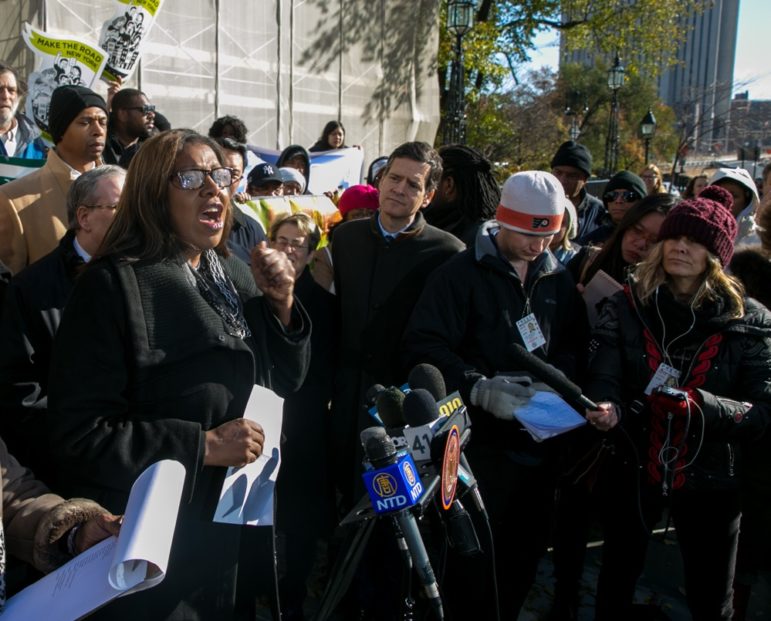
William Alatriste for the New York City Council
Public Advocate James (file photo) says liens should be transferred to a preservation trust aimed at protecting neighborhoods, not extracting fees.
The city’s program for collecting overdue property taxes and water bills through the sale of liens would change under a draft Council bill introduced this week—and could be see additional reform if advocates get their way.
“I’m pleased the City Council is planning to adopt some of our reforms but they did not far enough,” Public Advocate Letitia James, a longtime critic of the lien sales, told City Limits this week.
Since 1996, the city has sold property tax debts to special trusts that have the authority to collect the overdue money plus interest and fees, as well as the power—if they aren’t paid within a year—to foreclose on a property. The trusts floats bonds against the debts, investors buy the bonds, and the trusts make advance payment to the city out of that bond revenue. The city also issues liens to collect past-due water and sewer charges and fees owed to the city for emergency repairs to apartment buildings.
From 2008 through 2011, the city sold nearly 19,000 liens and collected $480 million a year in proceeds—as well as another $400 million or so every year in last-minute payments by property owners who wanted to avoid having a lien sold. In the years since lien sales were introduced, the city says the rate of property tax delinquency has dropped from 4.4 percent to 1.6 percent. The sales, says a recent report by a city task force, are “a critical compliance tool.”
But skeptics have questioned the fairness of the lien sales, which they say can deepen the distress of a homeowner who’s already struggling. A report issued in November by the Center for New York City Neighborhoods found that liens are far more common in majority black and Latino neighborhoods than in white communities.
And that’s a costly disparity. “Once sold to private investors, homeowners face severe, punitive costs that can often double the relatively small initial debt owed in a relatively short period of time,” the report read. CNYCN’s analysis found that the median lien debt of $6,562 “increased by 65 percent to $10,847 once fees and interest rates were included.” In light of that, “The tax lien sale process contributes to the displacement of longtime homeowners and their renters in communities that are already facing extensive market pressure and speculation.”
James agrees. “This just further increases income inequality and further increases debt for families struggling to make ends meet. I don’t think the answer is a stick. I prefer a carrot approach, and more transparency.”
The September report by the task force found that only 1.7 percent of the properties involved in lien sales were actually foreclosed upon through the lien process. But foreclosure isn’t the only impact felt by people who own property affected by a lien sale. “To cope with the financial pressure of paying off the lien, they might incur additional debt, skip mortgage payments, or take out a reverse mortgage,” CNYCN reported. “Thus the financial pressure of the lien sale can build on other hardships, forcing some low-income households to sell their homes.”
Concerns about lien sales play out against the echoes of the 2008 financial crisis and the gentrification and development that have reshaped much of the city. The recession and related foreclosure crisis severely impacted several New York City neighborhoods, resulting in a massive transfer of wealth from struggling homeowners—especially black families—to banks and others. More recently, many neighborhoods have seen rapid increases in property values, which on paper benefit homeowners but in practice can burden them by increasing the taxes the owe before they’re able to capitalize on the surge in land value.
“By exacting all of these fees, what we are doing is furthering and exacerbating income inequality in the city,” James told City Limits. The increase in the value of a home “means nothing if they can’t access their equity because they don’t have income to pay back these liens.”
The city has reformed the lien sale process already, improving outreach, strengthening notification procedures and offering more payment options. The draft bill introduced by Council Finance Chair Julissa Ferreras-Copeland in conjunction with the mayor would require more email and phone notification of owners who are in danger of having a lien sold against them and an expansion of payment-plan options. It also mandates the city use outreach events to survey “property owners who have received lien notices “in order to determine the circumstances that led to the creation of the lien.” And it calls for efforts to track what happens to properties affected by liens.
“The Department of Finance is very sensitive to this matter. It is why we do extensive outreach to these communities, in partnership with City Councilmembers to educate the public about the lien sale process, and to let them know about important options, such as entering into a payment plan – with no money down,” said a Department of Finance spokeswoman in an email. “We have recently begun sending warning notices to homeowners who have missed payments, but are not yet in default. We are also introducing legislation that will include increasing payment options available to homeowners in financial distress.”
James says negotiations over the legislation, which would permit lien sales in years 2017 through 2020, are still underway. She wants to see water and sewer debt excluded from the sales, and would prefer the city sell liens to a preservation trust with a mission of stabilizing homeowners and neighborhoods. There is, James says “an additional tool in our tool chest to address growing income inequality, and that is stabilizing homeowners and doing everything we can do to deal with the economic anxiety that exists. I think the administration understands that. The City Council understands that.”








